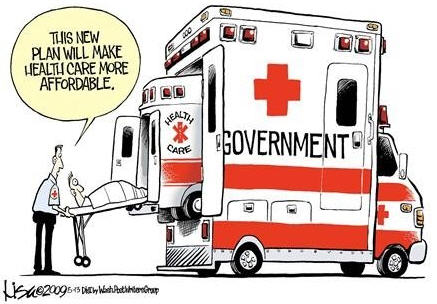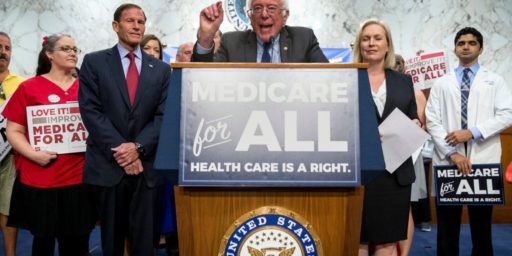ObamaCare 2.0
Charles Krauthammer proclaims “Obamacare Version 1.0 is dead” and helpfully proposes a version 2.0. Basically: No public option, no death panels end-of-life counseling, softpeddle government “best practices,” abandon cost-cutting, and guaranteeing universal coverage.
What’s not to like? If you have insurance, you’ll never lose it. Nor will your children ever be denied coverage for preexisting conditions.
The regulated insurance companies will get two things in return. Government will impose an individual mandate that will force the purchase of health insurance on the millions of healthy young people who today forgo it. And government will subsidize all the others who are too poor to buy health insurance. The result? Two enormous new revenue streams created by government for the insurance companies.
And here’s what makes it so politically seductive: The end result is the liberal dream of universal and guaranteed coverage — but without overt nationalization. It is all done through private insurance companies. Ostensibly private. They will, in reality, have been turned into government utilities. No longer able to control whom they can enroll, whom they can drop and how much they can limit their own liability, they will live off government largess — subsidized premiums from the poor; forced premiums from the young and healthy.
It’s the perfect finesse — government health care by proxy. And because it’s proxy, and because it will guarantee access to (supposedly) private health insurance — something that enjoys considerable Republican support — it will pass with wide bipartisan backing and give Obama a resounding political victory.
Krauthammer admits that “The financial and budgetary consequences will be catastrophic” but figures it’s a smart way to force people to swallow real socialized medicine because, when the bills come due, “the only remaining option will be to give up the benefits we will have become accustomed to. Once granted, guaranteed universal health care is not relinquished. Look at Canada. Look at Britain. They got hooked; now they ration. So will we.”
Dave Schuler thinks this would “carefully preserve most of the worst features of our present system.”
There are virtually no incentives at any level for controlling costs. Unfortunately, since we already pay nearly twice as much for healthcare per capita as an other OECD country and in this form healthcare reform would do nothing to change that, that would all but certainly result in stunting the growth of every sector of the economy other than healthcare which employs fewer people per dollar spent than most other sectors of the economy do (that’s what it means when you say that pay is higher in one sector than in another). See my previous post this morning.
So far as I can tell, Krauthammer is being serious here. But it may be the weirdest thing he’s ever written.
Update (Steve Verdon): My own personal view is that either way we will not address the real issue with health care, the costs. People are too obsessed with the side shows and partisan point scoring to tackle the actual issue. As such, things will continue on their unsustainable course for awhile, then “reform” will be forced on the country due to the unsustainable trajectory we are on. What will happen then? I don’t know, other than it probably wont be good.
Update (James Joyner): Ronald Bailey thinks Krauthammer is merely “predicting” rather than advocating this chain of events. That makes more sense although the irony is clearly too subtle as I’m still not getting it.
Meanwhile, Ezra Klein argues that “We ration. We ration without discussion, remorse or concern. We ration health care the way we ration other goods: We make it too expensive for everyone to afford.” But, as Bailey explains, that’s not what rationing means.







From Krauthammer’s article:
… and then both Schuler and Verdon complain that it does nothing to control costs.
That appears to be his specific point, though. His rationale appears to be that the bill can’t be passed with cost control, which equals pain. Pass now, deal with the pain later when we are forced to.
Right. But that strikes me to be a very bizarre view. It’s one thing coming from a fan of socialism, figuring getting the camel’s nose under the tent is the best way to get there. But from Krauthammer?
Strange as it may seem, I agree with Steve V.
Without tort reform there is no health care reform. And, where does the government get the power to mandate individual behavior?
Just curious Zelsdorf, say after your tort reform, a doctor gives you chemotherapy for a cancer you do not have. Or worse yet, removes parts dear to you.
What do you image “tort reform” doing?
Why does reform have to be forced upon anyone who is paying for their healthcare coverage themselves, regardless of cost increases? If they are willing to pay the fare, what exactly is the issue for them that requires a government diktat? And yes, I am in favor of getting rid of the pretax health care deduction.
In my view tort reform is a perfect example of a talking point rather than something substantive. Legal judgments are a vanishingly small proportion of total healthcare costs, roughly 2% IIRC. The argument is that fear of suit causes physicians to over-treat.
The problem is that everybody in the healthcare equation has an incentive to over-treat. Patients who only pay co-pays have little deterrent for demanding treatment that may be of little or no real benefit. Physicians who are paid by the procedure (and may be sued for failing to conduct that last test) have incentives to perform those procedures. Insurance premium are proportional to non-insurance healthcare spending. The higher the spending, the higher the premiums, the more the insurance companies make. Your Congressman has plenty of incentive to keep Medicare spending high and practically none to reduce it.
There’s something that has always baffled me about raising tort reform as the sole essential item in healthcare reform. Physicians may not ethically perform procedures that are of no known benefit to their patients. When you argue that defensive medicine is a primary driver of costs, you are arguing that physicians are unethical.
If you believe that physicians are unethical, should some of the ire be directed at them?
Note that I don’t believe that tort reform is a great deal more than a talking point and I don’t believe that defensive medicine is the primary driver of rising healthcare costs.
If we had a relatively straightforward healthcare system — single payer, whatever — then we could focus more effectively on costs.
Our patchwork system makes costs MORE difficult to address.
Cf. T.R. Reid:
In many ways, foreign health care models are not really “foreign” to America, because our crazy-quilt health care system uses elements of all of them. For Native Americans or veterans, we’re Britain: The government provides health care, funding it through general taxes, and patients get no bills. For people who get insurance through their jobs, we’re Germany: Premiums are split between workers and employers, and private insurance plans pay private doctors and hospitals. For people over 65, we’re Canada: Everyone pays premiums for an insurance plan run by the government, and the public plan pays private doctors and hospitals according to a set fee schedule. And for the tens of millions without insurance coverage, we’re Burundi or Burma: In the world’s poor nations, sick people pay out of pocket for medical care; those who can’t pay stay sick or die.
This fragmentation is another reason that we spend more than anybody else and still leave millions without coverage. All the other developed countries have settled on one model for health-care delivery and finance; we’ve blended them all into a costly, confusing bureaucratic mess.
Good article btw, not long.
“Tort reform” becomes less funny when the doc kills Granny and no one will take the case because the damage caps make trying the case prohibitively expensive.
Plaintiffs’ attorneys work on contingency and pay for experts etc. out-of-pocket. It’s hardly a secret that “punitive damages” are America’s version of “awarding attorney fees.” Where they’re capped or unavailable, and the actual damages (earning potential) are minimal, they can’t afford to take the case.
My own clients are healthcare folks, so they certainly benefit; but the honest defense-side lawyers know what’s going on.
So you’re of the opinion that a doctor never ever actually screws up, resulting in major consequences to a patient? Or you think that if doctors do screw up, the proper response is “walk it off, buddy; them’s the breaks”?
I think “tort reform” (such an awful euphemism) is an absolutely horrible idea. You remove the ability for patients who were actually harmed by physician incompetence to recover for their losses.
I think Krautheimer is serious in predicting this is what Congress/Obama will do. He is not approving. He calls it “the ultimate bait-and-switch” scheme.
Tort reform is a part of the solution. 2 percent here, 2 percent there, pretty soon we start adding up real savings. Quit looking for a magic bullet, it’s many solutions put together.
Co-pays mean smarter consumers. High deductibles mean smarter consumers. Those will both lower demanded yet often unnecessary services.
Speed up drug approval and shield drug makers from lawsuits in some instances. Drugs are becoming a bigger part of costs every day.
Once again, it’s many solutions, not one. Each of these solutions needs to be independent of the others and scrapped if it doesn’t work. Why are we betting all of our chips on one legislative hand? It’s stupid to do so.
It strikes me that if you add one bullet to Krauthammer’s prescription for Obama 2.0…
Convert the system from employer-based to individual-based selection of Healthcare Insurance (a la Wyden-Bennett)
… You then introduce an incentive to control costs. The individual consumer is exposed to real costs with an ability to manage it. This makes ObamaCare 2.0 (Wyden-Bennett) salable, and holds out at least a hope of being fiscally responsible.
I understand that most see pushing Wyden-Bennett as a windmill tilting exercise, but, the beasts are out there Pancho. Might as well saddle up and take a run at them.
See, here we go again. Blathering on about tort reform when it is a small, almost miniscule, part of the problem.
One word: Medicare.
That is where the sizable of the problem is or will be. We don’t need massive over-arching health care reform to start seeing some savings now. Obama could have started with Medicare and realize gains there, but he didn’t. Probably afraid he wont get re-elected.
@Steve P
Just curious. Could you give us 1) some examples wherein drug makers should be shielded and 2) some in which they should not ?
Dave –
As you know, I’ve read now umpteen of your posts on healthcare, and observe that you are now starting to frequently say things like:
“There’s something that has always baffled me about raising tort reform as the sole essential item in healthcare reform.”
“I don’t believe that defensive medicine is the primary driver of rising healthcare costs.”
I read alot about health care and HC reform, and I’m not impressed that lots and lots of people are taking these stridently narrow views. But you seem to be using these examples to beat back the notion that tort concerns (or other factors)are material contributors to the problem. Yes, 2% may be a measured statistic for awards, but it does not capture the attendant defensive practices. And these things all add up.
Now:
“The problem is that everybody in the healthcare equation has an incentive to over-treat. Patients who only pay co-pays have little deterrent for demanding treatment that may be of little or no real benefit. Physicians who are paid by the procedure (and may be sued for failing to conduct that last test) have incentives to perform those procedures etc.”
I wish I’d thought of that. Of course, some invisible third party is always paying.
Also:
“When you argue that defensive medicine is a primary driver of costs, you are arguing that physicians are unethical. If you believe that physicians are unethical, should some of the ire be directed at them?”
Perhaps. But do you really expect docs to put a lifetime of work or a significant portion of annual income at jeopardy for the ambulance chasers? I have been sued as a company director by the corporate version of an ambulance chaser. Its not comfortable. In the end game of the negotiation the guy called me and said: (paraphrased) “look, we are going in circles; yeah, you know our suit is baseless, and so do we, but its going to cost you about $1.0 MM to defend it; this is what we do. So do you want to settle for $500K?”
True story. So can you reasonably expect this would not affect behavior, in medicine or business?
The defensive practices canard.
Are they really defensive practices? Or profit leaders?
If you think about it, the “defensive practice” canard is a great excuse to send those blood samples to the lab you have a 30% stake in for a full panel when it’s really not required.
Especially when said physician knows he’s got malpractice insurance.
Occam’s Razor for just a second here.
Fair enough, PD. Let me explain.
I don’t have hard data to prove this one way or another and I don’t think it’s possible to obtain reliable hard data. Who’s going to admit that they function unethically?
Mainly I think what I think because it doesn’t comport with my experience of physicians. I’ve known a lot of docs over the years in a lot of different contexts not just as a patient but as friends and clients. Some have been egotistical SOB’s.
But most, again in my experience, have just been doing their best, doing what they’ve been trained to do, and doing what they think works. I don’t know that I’ve met one who’s looking over his shoulder at lawsuits.
Consequently, I think that while there may be some effect on costs at the margins as an effect of tort reform I think it’s much more likely that docs will just keep doing what they’ve been doing and what they’ve been trained to do and what they think works and the reform won’t have much effect on costs at all.
But that’s just an intuition. It’s not a fact or something I can back up with statistics.
I think maybe you missed all those angry old people at the town hall meetings? Usually it is the Democrats who demagogue Medicare cuts. This time it is the Republicans. And it always works.
I’m replying to charles austin’s post. Sir, I don’t understand it. Speaking personally, I won’t be affected by any of the plans that have a chance of being enacted. My wife and I have excellent coverage from Medicare and from my former employer, a major research university, and my retiree coverage is administered by a big, financially healthy insurance company. If the House bill is enacted, it is remotely conceivable that a public option would be so popular that the company through which I get retiree coverage would be forced out of business. I can’t see this happening, given the fondness the Republican party has for the health insurance industry.
I realize your situation is different, and that you as an employer may have your interests affected adversely by the employer mandate requirement. But aren’t all employers affected similarly if their firms are big enough? And if your objections to the plan do arise out of self interest, wouldn’t it be more candid to say so?
Stan
What good does a good private plan get you if the Doctors are allowed to charge only a specific amount and required to take the first one in line, public or private. Also if there is large decrease of Doctors and clinical facilities because they are only allowed to be given a small compensation for their work.
The problem with giving away freedoms or not caring when it doesn’t affect you, is that it usually will end up effecting you in ways you did not fathom including setting up a process where the government will someday take something you do care about. Socialism doesn’t work. Capitalism has it problems but it’s overall quality of life is usually much higher than the alternatives.
Wayne,
A fairly bright high school freshman would be embarrassed to make that “argument”.
Ah you mean like Bush & habeas corpus? Point taken.
And you found this somewhere in the bill? Naw, you just made it up.
“But, as Bailey explains, that’s not what rationing means.”
That depends on which dictionary you consult. Even so, for the 18,000 or so Americans who die every year because they have been shut out of the health care system, I don’t think Bailey’s semantic sensibilities mean a whole lot.
lol, why because their teachers hate Bush too?
So many people defending ambulance chasers..LOL..
So when the Government socializes Health care will the Democrat trial lawyers even have to sue any more or will
Darthdeathpanelerr.. Darthfocusgroup just write them a check after the The Booboofairyerr… czar figures out a socially justified amount for each reparation?The health insurance bill that will probably emerge from Congress will a) end the practice of insurance company’s denying coverage based on pre-existing conditions, and b) end the practice of terminating coverage when an insured party needs expensive medical treatments. This will provide protection to all Americans from the danger of losing their health insurance when they most need it. The bill will c) require everybody to have health insurance, either as a job benefit or by private purchase, with subsidies to those who have to purchase insurance out of pocket, and d) will require large firms to either provide medical benefits to their employees or pay a financial penalty, so much for each uninsured employee. The bill may or may not include a publically financed insurance plan to provide competition to private insurers and thereby control costs.
How any rational person could describe this as socialism is beyond me. And how anybody could make such a charge and expect it to be effective strikes me as downright stupid.
Dave Schuler (009 | 08:01 pm) you hit the nail squarely on the head, unfortunately you missed the trees for the forest, or something like that. To wit:
The problem lies that rapidly expanding knowledge makes what we docs were trained to do often not quite the correct thing to do. Without some degree of best practice control, or practice oversight, you are never really going to control cost. Take an hour off and cost compare the different forms of prostate cancer therapy. Alternatively, you could take a gander at stent insertion, a surgical procedure performed with much less frequency by those dastardly penny pinching Europeans.
With this I can agree:
I might add a few other traits. But, if you can get into the doc’s parking lot at your local hospital, rest assured it is not the primary care doc that is driving the Bentley.
R. Paul Miller, MD
An interesting discussion, but like most I’ve seen, seems to focus more on potential solutions than on first understanding the problems. Dave Schuler begins to address what few others do: the real causes of America’s rapidly rising health care costs (and it’s not money spent on health care lawsuits or on awards). For those interested in a primary doctor’s analysis, I’d invite you to click here for an article which aims to analyze the true cause of our out-of-control health care costs.
I’d invite you to click here for an article which aims to analyze the true cause of our out-of-control health care costs
Interesting article. I definately recognize the patiens with a cold story: my husband always wants me to go to our GP when I have a cold and I keep telling him that she would be a millionaire if she found a cure for the common cold.
Re costs of overtreatment: I thought that this 2008 discussion with Shannon Brownlee (author of ‘overtreated’) was interesting.
We try to be more efficient, to cut down costs. Having the GP as a gatekeeper helps, use of electronic tools helps and one of the advantages of having a basic always insured healthpackage is that there is a lot less discussion between doctors/patiens and the health insurance.
I agree that the stats about life expectancy are not the most important comparison material. The reason I think our health system is much better isn’t that we live on average 1 or 2 years longer, nor is it because I think our system is perfect. But I can always get medical care, fast and reliable, without ever thinking about the costs. Medical bankrupcy doesn’t exist here.